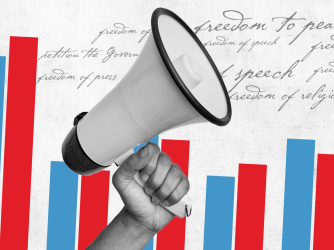Table of Contents
Biden Administration’s plan to combat anti-Semitism online would violate the First Amendment

Shutterstock.com
The first part in this series provided analysis of the provisions in the Biden Administration’s “U.S. National Strategy to Counter Antisemitism” — that address anti-Semitism in the context of education. The second part analyzed the proposal’s plan to combat anti-Semitism in pop culture. This final part discusses the plan’s approach to fighting anti-Semitism online.
Biden’s strategic plan proposes several problematic ideas with respect to combating anti-Semitism online. While there is no doubt bigotry is present online just as it is offline, government pressure on online platforms to censor is not the answer. Perhaps most shockingly, the plan calls on Congress to remove the immunity online platforms enjoy under federal law (Section 230) for content others post on their platforms. The plan states:
Congress should remove special immunity for online platforms. This should include removing immunity if an online platform utilizes an algorithm or other computational process to amplify or recommend content to a user that promotes violence, or is directly relevant to a claim involving interference with civil rights or neglect to prevent interference with civil rights.
This proposal goes far beyond addressing anti-Semitism and represents a full scale attack on Section 230 by fundamentally altering the government’s ability to regulate all expression online. After all, it is Section 230’s promise of immunity — which this plan proposes removing — that checks the government’s ability to incentivize social media platforms and internet service providers to restrict user speech online.

Biden Administration’s plan to address anti-Semitism includes censorship
News
The Biden Administration issued a strategy document for fighting anti-Semitism in education, sports, pop culture, and online.
This proposal is also unconstitutional. First, as we have argued in our Statement on Free Speech and Social Media, “[a]ny government intrusion into platforms’ editorial discretion threatens the platforms’ own expressive rights under the First Amendment — and potentially that of other speakers.” But also, the proposal suggests that an online platform should lose its immunity if it merely “utilizes an algorithm or other computational process to amplify or recommend content to a user that promotes violence, or is directly relevant to a claim involving interference with civil rights or neglect to prevent interference with civil rights.”
The government may not selectively strip immunity from platforms for promoting or recommending posts with expressions of viewpoints it doesn’t like.
The Supreme Court just held that social media platforms are not liable for violent, terrorist acts perpetrated by others on claims that platforms had aided or abetted the terrorism simply by “setting up their algorithms to display content relevant to user inputs and user history.”
What’s more — even if a social media platform could be held liable for hosting or using an algorithm that promotes illegal content — expression that “promotes violence” does not meet the Supreme Court’s exacting test for what constitutes unprotected incitement as stated in the landmark case of Brandenburg v. Ohio. And there is no credible argument that stripping a platform of immunity for recommending content to a user that “is directly relevant to a claim involving interference with civil rights” — content that does not fall into any of the limited exceptions to the First Amendment — is constitutionally permissible.
The plan proposes changing the law to allow for the removal of a platform’s immunity for amplifying or promoting any content on the topic of civil rights. Platforms have a First Amendment right to use algorithms that promote any speech that is protected under the First Amendment.
Addressing anti-Semitism and other forms of bigotry, whether it be in education, pop culture, or online, is an important goal, but when a plan relies on censorship, the ends cannot justify the means.
But the strategic plan doesn’t stop there. It also asks online platforms to adopt “zero-tolerance” terms of service for “hate speech, including antisemitism.” This would apparently mean adopting policies to “[p]ermanently ban repeat offenders, both personal accounts and extremist websites.” And it calls on them to “[e]ncourage and support trusted community moderators who receive dedicated, ongoing training in hate speech and bias, including antisemitism and its tropes.”

Biden plan wrongly proposes censorship to reduce anti-Semitism in pop culture
News
This series is an analysis of provisions in the Biden Administration’s “U.S. National Strategy to Counter Antisemitism” that address anti-Semitism in education, pop culture, and online.
Who are these “trusted” moderators who we should all rely on to judge whether speech is sufficiently hateful to warrant banishment? This is inherently unworkable given there is no agreed upon definition of hate speech. Plus, as there is no hate speech exception to the First Amendment, the plan essentially amounts to the government urging private actors to censor speech in ways the government cannot directly.
Addressing anti-Semitism and other forms of bigotry, whether it be in education, pop culture, or online, is an important goal, but when a plan relies on censorship, the ends cannot justify the means. It’s disappointing that this plan, and the Department of Education’s track record and latest actions, demonstrate an unacceptable willingness to censor.
FIRE will continue to monitor the administration’s actions focused on combating anti-Semitism and other forms of bigotry to ensure such measures, however laudable in their aim, do not encroach on fundamental First Amendment rights.
Recent Articles
FIRE’s award-winning Newsdesk covers the free speech news you need to stay informed.

New FIRE poll: Americans equally skeptical Biden or Trump will protect First Amendment rights

Here’s what student journalists need to know about covering campus protests



